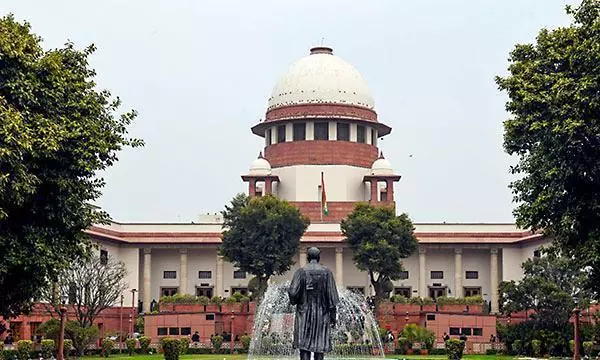
SC’s opinion on Presidential Reference a shot in the arm for Centre
Constitution bench delivers big relief to Centre, rules Article 142 does not allow 'deemed assent' or setting timeline for President or Governor

The Supreme Court’s opinion on the Presidential Reference on the court’s powers to set timelines for Governors and the President to decide on the fate of a Bill under their consideration is a shot in the arm for the Centre.
Opposition-ruled states, which have routinely found their legislative agenda crippled by brazenly obstructionist Governors have been handed out only nominal relief.
The opinion by the five-judge Constitution Bench headed by Chief Justice of India BR Gavai demolishes much of what the two-judge Bench of the apex court had sought to weave with its judicial overreach by not only setting out timelines for Governors and the President but by also innovating the concept of “deemed assent” in case of inordinate delay by Governors considering Bills passed by any Assembly.
Direct rebuke
In what can only be termed a direct rebuke of the two-judge bench’s direction on “deemed assent”, the Constitution Bench asserted that Article 142 grants no license to override explicit constitutional requirements or to substitute the President’s or Governor’s role with a judicial fiction.
“The exercise of constitutional powers and the orders of/by the President or Governor cannot be substituted by this Court in any manner under Article 142…”
Also Read: Governors, President can’t sit on bills indefinitely but timelines can’t be fixed: SC
Article 142 does not allow the concept of “deemed assent”, the court held, while stressing that such assent would only mean “usurpation” of powers of a constitutional authority by another and violate the “doctrine of separation of powers” which is part of the Basic Structure of Constitution.
Article 200
Delivering its opinion on the 14 questions posed by President Droupadi Murmu in the Presidential Reference, the CJI-led Bench settled the long-contested grey zone surrounding Article 200 of the Constitution by concluding that Governors need not act on the aid and advice of the Cabinet on assenting to or withholding assent to a Bill.
Also Read: Presidential reference | Setting fixed timelines for Bill assent poses challenges: SC
In a limited reprieve to the States (read: those governed by the BJP’s Opposition parties), the court held that while Governors and the President enjoy a level of “elasticity” in terms of the time they can take to give their view on a Bill, they cannot use silence as a shield against accountability.
Governor has 3 options
As such, the Bench dismissed the Centre’s arguments that Governors have the option to withhold assent to a Bill without returning the Bill to the Assembly. In its opinion, the court said the Governor has the specific options of granting assent, reserving the Bill for the President’s consideration, or withholding assent and returning the Bill to the legislature with comments for reconsideration.
The option of “withholding without returning”, however, in the Court’s view, would “derogate the principle of federalism”.
Limited judicial scrutiny
In an opinion that comes as another big relief for the Centre and its unelected yet constitutional interlocutors in the States, the Court also opined that the merits of a Governor’s decision on a Bill remain beyond judicial scrutiny in accordance with Article 361.
The court ruled that Article 361 envisages an “absolute bar on judicial review” of the actions of a Governor under Article 200 but added that it “cannot be used to negate the limited scope of judicial review that this court is empowered to exercise in cases of prolonged inaction by the Governor”.
It is only a “glaring circumstance of inaction that is prolonged, unexplained, and indefinite” that, in the court’s view, would attract “limited judicial scrutiny”.
Also Read: RN Ravi refutes DMK's claim on delaying assent to bills; releases data
“The court can issue a limited mandamus for the Governor to discharge his functions under Article 200 within a reasonable time period without making any observation on the merits of the exercise of discretion”, the court ruled.
Having so concluded, the court however left unanswered what time span of inaction it would consider as “prolonged” or “indefinite”, considering that the overarching opinion of the court itself was that no timelines can be set for a Governor to decide on a Bill.
President’s powers
The court has applied similar logic to the powers of the President, under Article 201, with regard to Bills referred to her by a Governor. The President’s decisions on Bills reserved for consideration cannot be examined on merits, nor can the judiciary bind the President to any timeline, the court noted, while also adding that though the President is under no obligation to seek the apex court’s opinion under Article 143 merely because a Bill has been reserved, she could do so if she felt it necessary.
Also Read: Governor can't examine a bill's legislative competence: Bengal govt to SC
The court has also held that judicial review would apply only to enacted laws and not to Bills in transit (pending legislation or Bills not yet assented to and notified into Acts).
Some questions in the Reference, including those concerning the scope of Article 145(3) or the exclusive domain of Article 131, were left unanswered on grounds of irrelevance to the issues posed.

